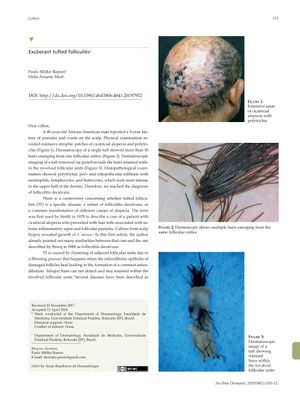Exuberant Tufted Folliculitis
February 2019
in “
Anais brasileiros de dermatologia/Anais Brasileiros de Dermatologia
”

TLDR Tufted folliculitis is common in patients with folliculitis decalvans.
The document described a case of a 40-year-old African-American man with a 5-year history of pustules and crusts on the scalp, diagnosed with folliculitis decalvans. The condition involved extensive atrophic patches of cicatricial alopecia and polytrichia, with more than 30 hairs emerging from one follicular orifice. Histopathological examination showed polytrichia and an intense inflammatory infiltrate. The article discussed the controversy over whether tufted folliculitis (TF) is a specific disease or a manifestation of various alopecia causes. It suggested that the term TF could be replaced with polytrichia for clarity. Despite the debate, TF was frequently observed in patients with folliculitis decalvans, with 88% of 82 patients in a retrospective study presenting with TF.







